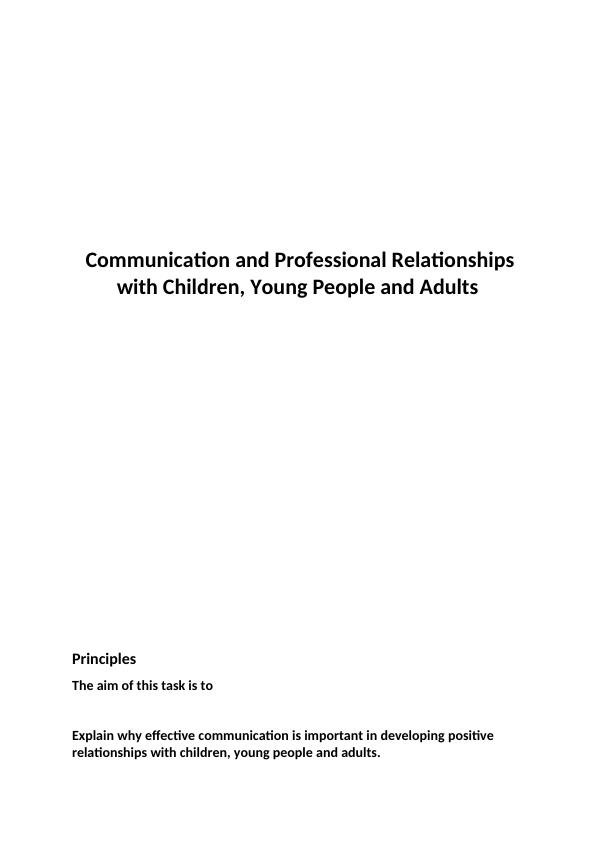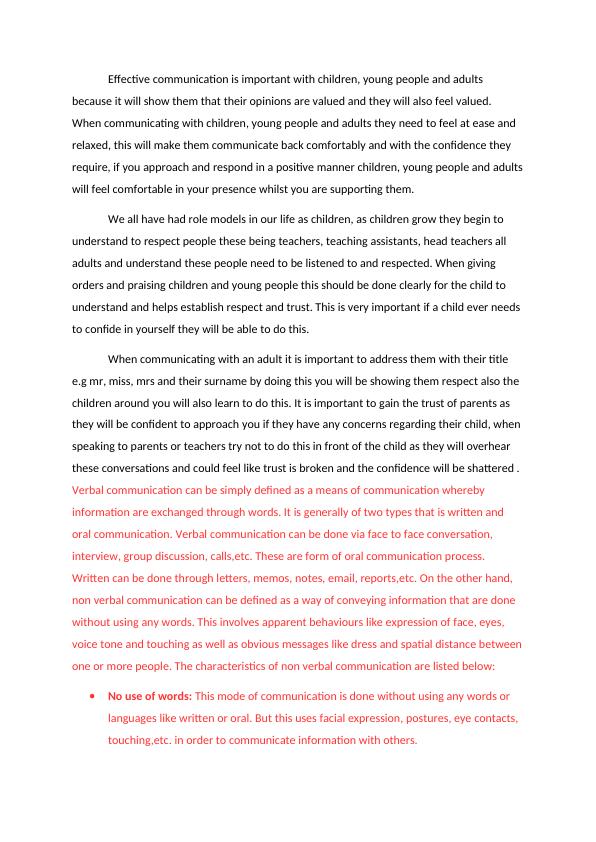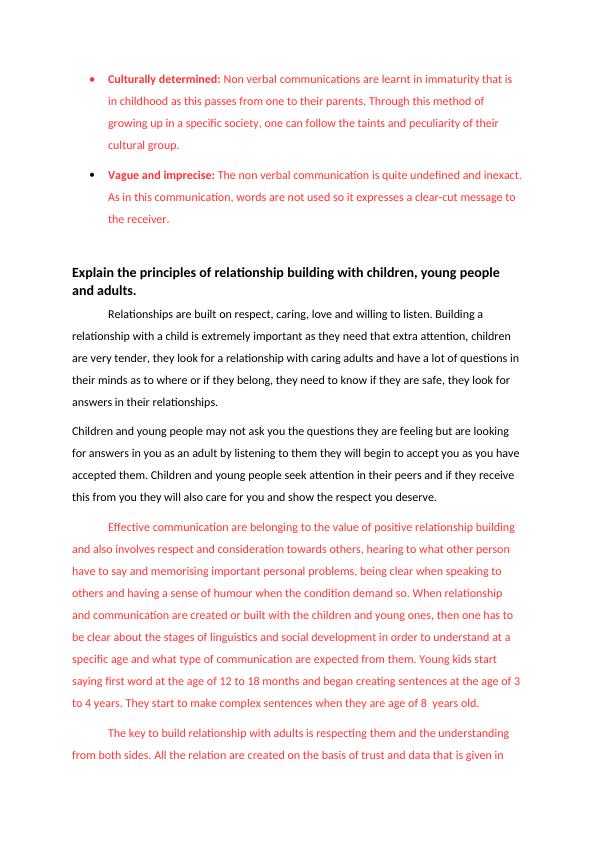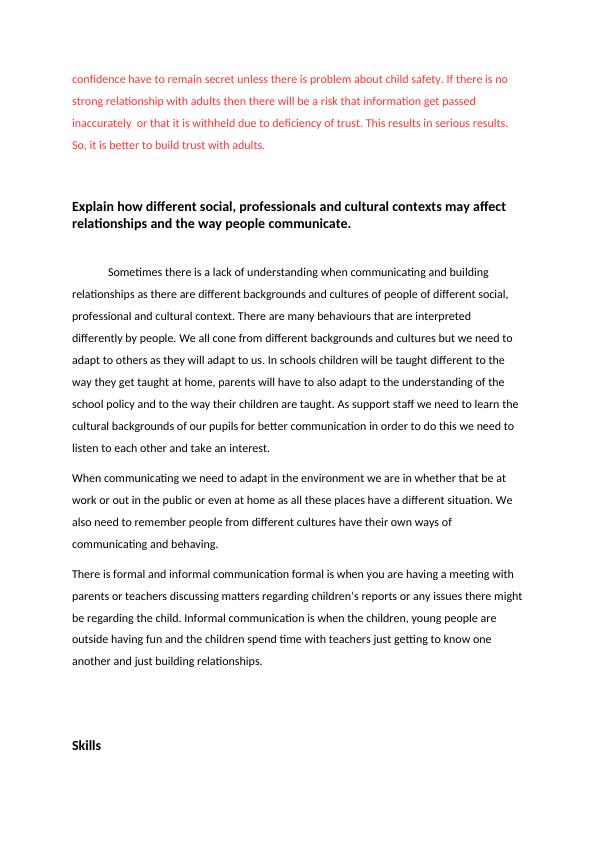Communication and Professional Relationships with Children, Young People and Adults
12 Pages4476 Words475 Views
Added on 2020-07-23
Communication and Professional Relationships with Children, Young People and Adults
Added on 2020-07-23
ShareRelated Documents
Communication and Professional Relationshipswith Children, Young People and AdultsPrinciplesThe aim of this task is to Explain why effective communication is important in developing positive relationships with children, young people and adults.

Effective communication is important with children, young people and adults because it will show them that their opinions are valued and they will also feel valued. When communicating with children, young people and adults they need to feel at ease and relaxed, this will make them communicate back comfortably and with the confidence they require, if you approach and respond in a positive manner children, young people and adultswill feel comfortable in your presence whilst you are supporting them.We all have had role models in our life as children, as children grow they begin to understand to respect people these being teachers, teaching assistants, head teachers all adults and understand these people need to be listened to and respected. When giving orders and praising children and young people this should be done clearly for the child to understand and helps establish respect and trust. This is very important if a child ever needsto confide in yourself they will be able to do this.When communicating with an adult it is important to address them with their title e.g mr, miss, mrs and their surname by doing this you will be showing them respect also the children around you will also learn to do this. It is important to gain the trust of parents as they will be confident to approach you if they have any concerns regarding their child, whenspeaking to parents or teachers try not to do this in front of the child as they will overhear these conversations and could feel like trust is broken and the confidence will be shattered. Verbal communication can be simply defined as a means of communication whereby information are exchanged through words. It is generally of two types that is written and oral communication. Verbal communication can be done via face to face conversation, interview, group discussion, calls,etc. These are form of oral communication process. Written can be done through letters, memos, notes, email, reports,etc. On the other hand, non verbal communication can be defined as a way of conveying information that are done without using any words. This involves apparent behaviours like expression of face, eyes, voice tone and touching as well as obvious messages like dress and spatial distance betweenone or more people. The characteristics of non verbal communication are listed below:No use of words: This mode of communication is done without using any words or languages like written or oral. But this uses facial expression, postures, eye contacts, touching,etc. in order to communicate information with others.

Culturally determined: Non verbal communications are learnt in immaturity that is in childhood as this passes from one to their parents. Through this method of growing up in a specific society, one can follow the taints and peculiarity of their cultural group.Vague and imprecise: The non verbal communication is quite undefined and inexact.As in this communication, words are not used so it expresses a clear-cut message to the receiver. Explain the principles of relationship building with children, young people and adults.Relationships are built on respect, caring, love and willing to listen. Building a relationship with a child is extremely important as they need that extra attention, children are very tender, they look for a relationship with caring adults and have a lot of questions in their minds as to where or if they belong, they need to know if they are safe, they look for answers in their relationships.Children and young people may not ask you the questions they are feeling but are looking for answers in you as an adult by listening to them they will begin to accept you as you have accepted them. Children and young people seek attention in their peers and if they receive this from you they will also care for you and show the respect you deserve.Effective communication are belonging to the value of positive relationship building and also involves respect and consideration towards others, hearing to what other person have to say and memorising important personal problems, being clear when speaking to others and having a sense of humour when the condition demand so. When relationship and communication are created or built with the children and young ones, then one has to be clear about the stages of linguistics and social development in order to understand at a specific age and what type of communication are expected from them. Young kids start saying first word at the age of 12 to 18 months and began creating sentences at the age of 3to 4 years. They start to make complex sentences when they are age of 8 years old. The key to build relationship with adults is respecting them and the understanding from both sides. All the relation are created on the basis of trust and data that is given in

confidence have to remain secret unless there is problem about child safety. If there is no strong relationship with adults then there will be a risk that information get passed inaccurately or that it is withheld due to deficiency of trust. This results in serious results. So, it is better to build trust with adults.Explain how different social, professionals and cultural contexts may affect relationships and the way people communicate.Sometimes there is a lack of understanding when communicating and building relationships as there are different backgrounds and cultures of people of different social, professional and cultural context. There are many behaviours that are interpreted differently by people. We all cone from different backgrounds and cultures but we need to adapt to others as they will adapt to us. In schools children will be taught different to the way they get taught at home, parents will have to also adapt to the understanding of the school policy and to the way their children are taught. As support staff we need to learn the cultural backgrounds of our pupils for better communication in order to do this we need to listen to each other and take an interest.When communicating we need to adapt in the environment we are in whether that be at work or out in the public or even at home as all these places have a different situation. We also need to remember people from different cultures have their own ways of communicating and behaving.There is formal and informal communication formal is when you are having a meeting with parents or teachers discussing matters regarding children’s reports or any issues there mightbe regarding the child. Informal communication is when the children, young people are outside having fun and the children spend time with teachers just getting to know one another and just building relationships. Skills

End of preview
Want to access all the pages? Upload your documents or become a member.
Related Documents
Literacy Resource Teaching Kit for Pre-School Childrenlg...
|15
|3307
|343
Impacts of Non Verbal Communication on Everyday Human Interactionlg...
|1
|550
|448
Educational Program and Practice in Early Childhoodlg...
|6
|1220
|33
Interpersonal Communication: Barriers, Skills and Resources for Communicating with Children Grouplg...
|6
|1423
|492
Effective Verbal and Non-Verbal Communication Strategies for Mr. Burnumlg...
|7
|1607
|30
Children's Oral Language Development and Language Ruleslg...
|5
|821
|68
